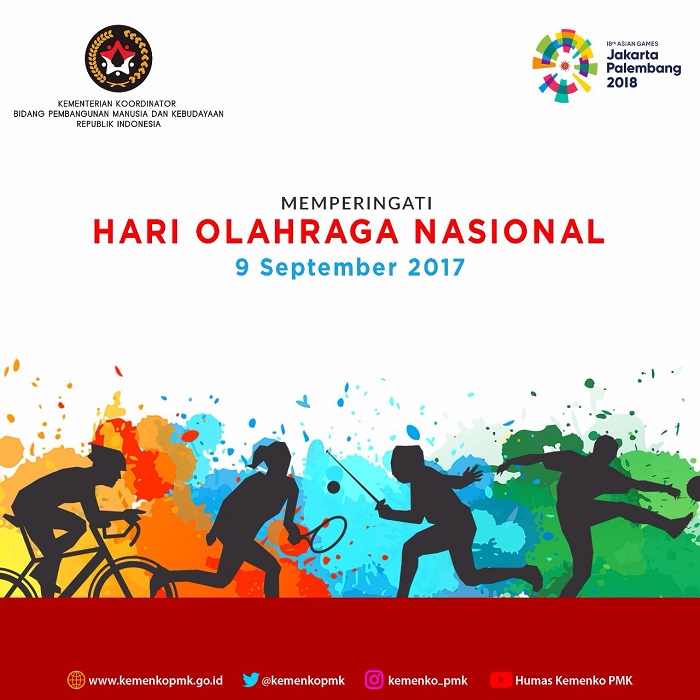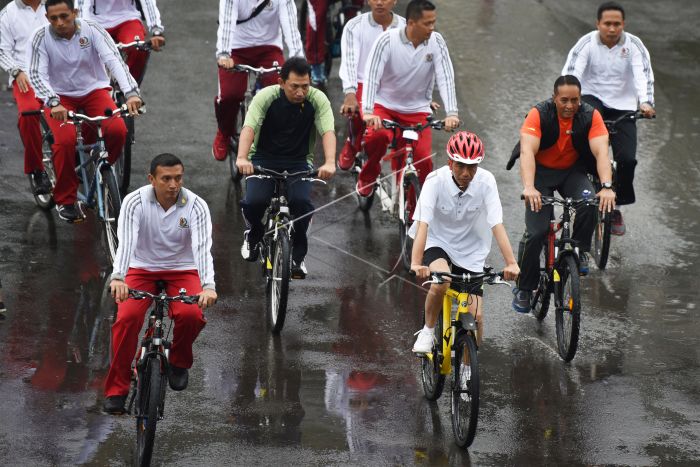Friederike Trotier
Even more than being active in sport, people enjoy talking about it. This is the case not only for small talk but also for ‘big talk’, including political messages that are often linked to current issues though transmitted through a sporting context. Thus, sport is one of the fields in which various stories are created. They reveal something about the nature and role of sport but even more about the perception of the story teller and the local context. A national sports day fits well with the scheme of conveying messages and telling stories, as its focus is on ceremonies, honoring athletes and national memory. So what do stories of Hari Olahraga Nasional (National Sports Day), first celebrated in 1983, tell us about different perceptions of sport and the Indonesian nation?
The story of the Indonesian struggle
One central story of Hari Olahraga Nasional is about struggle, perseverance and creativity. It refers to the origin of Pekan Olahraga Nasional (National Sports Week), or PON, in 1948 and conveys a picture of a young but determined nation. In the national historiography, the first PON is linked to the Indonesian Revolution and the struggle for national unity and international recognition. Consequently, the story has a strong nationalist message and rhetoric. When the Suharto administration chose the date 9 September for Hari Olahraga Nasional – the day of the opening ceremony of the first PON – the relevance of the event for the nation became evident. The story of the origin of PON is still important for the celebration of Hari Olahraga Nasional because it combines Indonesian heroic history with characteristics that politicians and sports officials today still see as desirable for the Indonesian nation.
Even before Indonesia proclaimed its independence it had made an entrance on the international sport stage. A team of the All Indonesian Football Federation participated in the 1938 World Cup in France. From the Indonesian perspective it seemed only consistent to then send a delegation to the 1948 Olympic Games in London. The goal was to underline Indonesia’s status as an independent country and to demonstrate sporting prowess on an international stage. This was during the Indonesian War of Independence against Dutch military forces, so the participation of Indonesian athletes at the Olympic Games would have made a political statement for the Indonesian case. The British organisers, however, barred the Indonesian delegation from the event as they did not accept their Indonesian passports and stated that the Indonesians did not meet the requirements. The lack of broader international recognition of Indonesia further complicated the attempt to participate at the Olympic Games. In response, Persatuan Olahraga Republik Indonesia (Republic of Indonesia’s Sports Union, PORI) looked for alternatives and decided to organise a national sports event taking place inside the country. The first PON was then held in the Javanese city Surakarta (Solo).
The background of the first PON provides several possibilities for patriotic interpretation. Taking place in September 1948, it was held in the middle of the struggle against the Dutch military forces. The attempt to take part in the Olympic Games in London was part of the struggle for international recognition and acceptance. In this light, the refusal of the British was seen as an arrogant way of treating the people of a (former) colony and as a show of solidarity with the Dutch oppressors in Indonesia. The organisers of PON, in contrast, demonstrated their stamina and initiative, not willing to give in after the exclusion from the Olympics. They were not discouraged but provided the Indonesian people and the outside world with an example of pride and creativity. Furthermore, although the participation of about 600 athletes was limited to those on Java due to the war, these athletes demonstrated their commitment to Indonesia and their part in the national struggle.
Key events were the two main ceremonies. President Sukarno officially opened the first PON in Solo and Sultan Hamengkubuwono IX, as a representative of KORI (the Indonesian Olympic Committee), attended the closing ceremony. The political patronage of two central figures of the young republic emphasised the event’s symbolic importance for the nation. Hence, from the beginning, sports events in Indonesia have been of political interest as a way to demonstrate national unity, pride and revolutionary struggle. The first PON was a chance to strengthen Sukarno’s position as president and to give national relevance to sporting activities. More than a decade later, Sukarno was still highly committed to sports as he secured Indonesia’s hosting of the 1962 Asian Games and initiated the Games of the New Emerging Forces one year later.
The story of patriotism
Hari Olahraga Nasional has been held more than thirty times. As an annual event, it is more regular than other events such as PON, the Southeast Asian Games or the Asian Games. The celebrations are linked to politicians’ and officials’ high hopes of reinforcing nation and character building, prestige, national awareness and patriotic feelings. During more recent Hari Olahraga Nasional, further stories of the Indonesian struggle have been told. The celebration of sport is a matter of political interest on the national as well as regional level. A topic of continuing relevance is Indonesian patriotism expressed through achievements in sporting arenas.
To convey patriotic feelings, a Hari Olahraga Nasional celebration can include the singing of the ‘Mars Patriot Olahraga’ (‘March of the Sports Patriots’). The song is considered a ‘lagu wajib’ (compulsory song) for Indonesian athletes and is therefore very apt for the ceremony. The title alone suggests a blend of sports, patriotism and military spirit. The lyrics contain several metaphors of warfare such as fighting on the battlefield, the sacrifice of blood and bones, as well as the facing of an opponent. Furthermore, the song encourages devotion to and sacrifice for Indonesia. Thus, the song has a strong nationalistic and patriotic tone. The athletes and supporters who sing this song or listen to it are supposed to be filled with passion for their country and inspired in their task to bring it honour. According to the lyrics, the sports arena becomes a battlefield where Indonesian athletes fight for their country. The final goal is to gain success and honour and consequently make Indonesia a mighty and powerful country that will receive the attention and respect of the whole world. This song is mainly targeted at Indonesian athletes who represent their county. Nevertheless, the spirit of patriotism can also inspire those who attend Hari Olahraga Nasional celebrations.

The story of unity in diversity
The latest celebration of Hari Olahraga Nasional took place in 2017 with the motto ‘Olahraga Menyatukan Kita’ (‘Sport Unites Us’). Only several months after the Jakarta gubernatorial election, where identity politics played a major role, this celebration of sport was used to convey messages of unity and acceptance of differences. Presumably, the mobilisation along religious and ethnic lines during the election campaign in Jakarta and its relevance for the upcoming provincial and general elections induced the minister of youth and sport to emphasise that sport does not recognise differences in religion, race and ethnicity. The celebration of Hari Olahraga Nasional thus became the platform for the story of Indonesian unity through sport.
One symbol of unity in diversity portrayed was the success story of the badminton players Tontowi Ahmad and Liliyana Natsir who won the gold medal at the 2016 Olympic Games in the mixed doubles category. Their different origins, ethnicities and religions did not prevent them from becoming the most successful badminton mixed pair in the world. Rather, these two players with different backgrounds, through their joint sporting endeavour, function as role models for unity in diversity in Indonesia. This example shows that the Indonesian government perceives the theme of unity in diversity as being of high relevance in times of increasing religious radicalism and intolerance, and is therefore supporting sports initiatives and values associated with sports during Hari Olahraga Nasional and beyond.
The next Hari Nasional Olahraga will take place only a few days after the closing ceremony of the Asian Games. That means the themes are already set: the second Indonesian hosting of this prestigious sports event and the achievements or failures of the Indonesian athletes. Perhaps the Asian Games will produce new stories about the Indonesian nation which will become part of Hari Olahraga Nasional celebrations and even national memory. Existing themes, such as the memory of Indonesian struggle, the boosting of patriotism and the call for unity in diversity will continue to be part of sports celebrations and political agendas in Indonesia.
Friederike Trotier (friederike.trotier@uni-passau.de) is a research assistant at the University of Passau. She teaches at the Department of Comparative Development and Cultural Studies - Southeast Asia. Her recently finished PhD was about sport and city politics in Indonesia.
